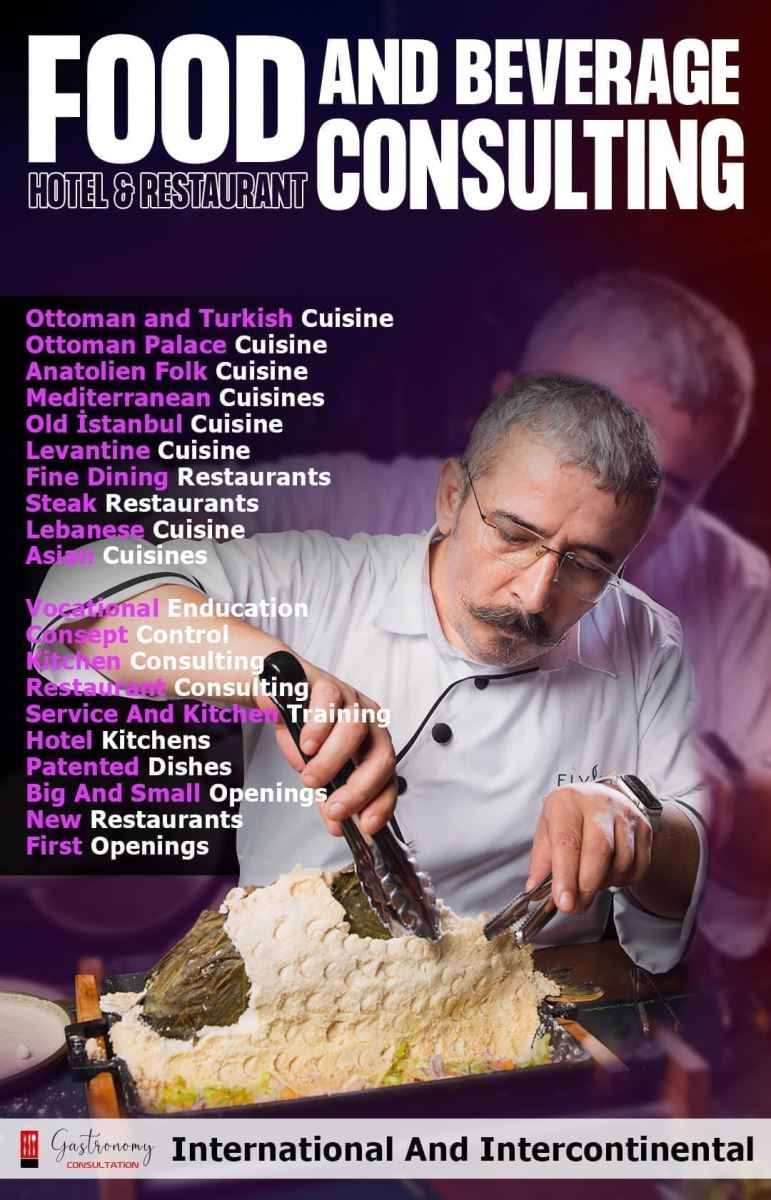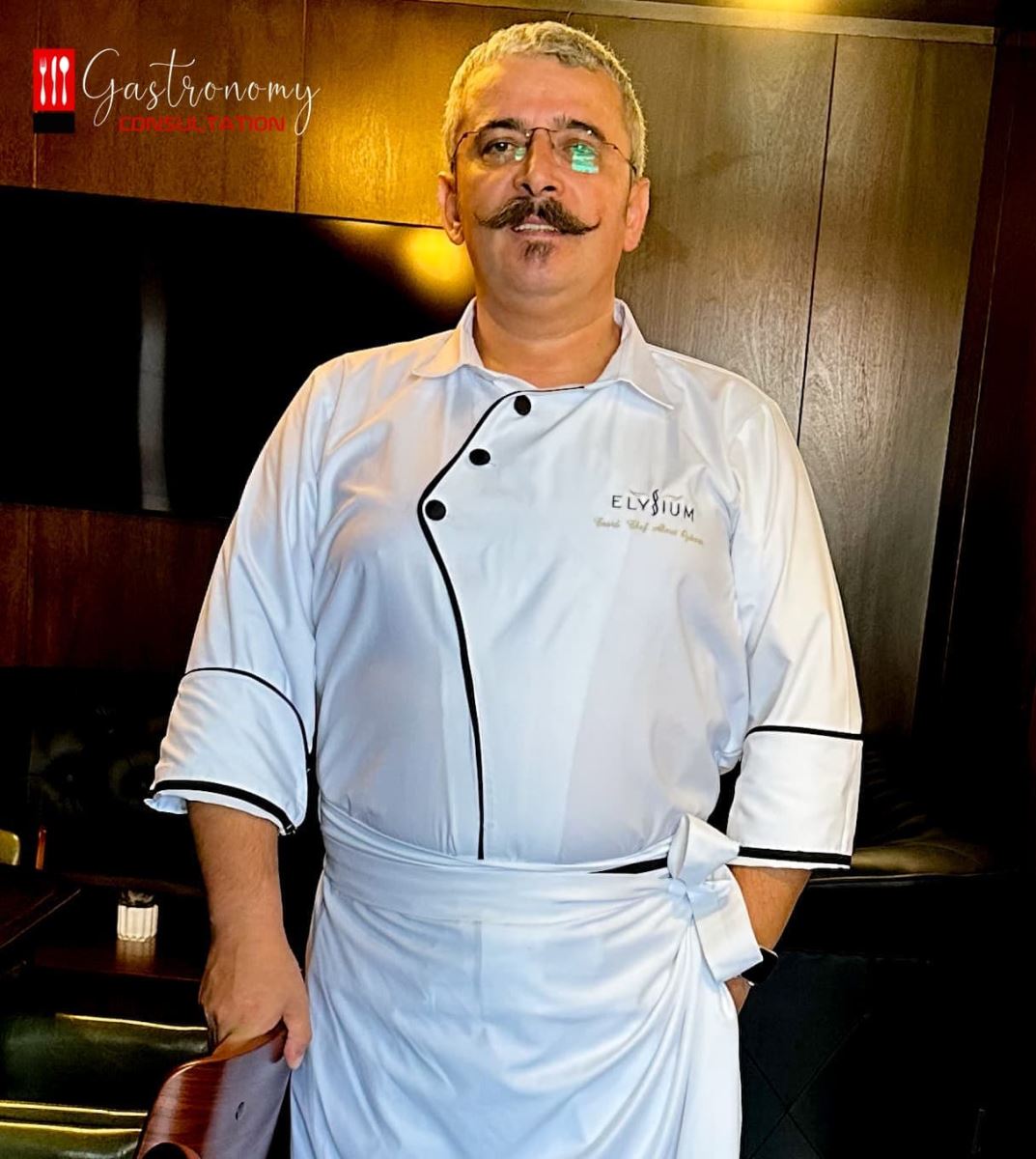World Restaurant Trends, New Gastronomy Trends, Hotel Kitchen Trends, New Kitchen Trends, World Food Trends, Tourism Trends, Guest Satisfaction in Restaurants, 2024 World Gastronomy Trends, Sustainable Restaurant Cuisine, Sustainable Restaurant Menu, hotel kitchen consultancy, Sample Hotel Open Buffets, Hotel Kitchen Organization. Hotel Kitchen Consultancy is a specialized service that provides expert advice...
 What is Hotel Kitchen Consultancy? What are the Most Important Features of Hotel Kitchen Consultancy?
What is Hotel Kitchen Consultancy? What are the Most Important Features of Hotel Kitchen Consultancy?
Coord. Chef Ahmet ÖZDEMİR
Hotel Kitchen Consultancy is a specialized service that provides expert advice, planning, and solutions to hotel businesses in relation to their kitchen operations. These consultants work closely with hoteliers to improve various aspects of their kitchen, (
World Restaurant Trends) from food production and menu planning to staff training and equipment selection. Below are some of the most important (
Sustainable Restaurant Cuisine and
Sustainable Restaurant Menu) features of hotel kitchen consultancy:
Menu Development
Consultants can help hotels develop or revamp their menu by conducting market research, identifying trends, and considering the target audience. This often involves creating dishes that are not only delicious but also cost-effective and representative of the hotel's brand.
Operational Efficiency
Consultants assess the current kitchen (
New Gastronomy Trends) operations and recommend changes to enhance efficiency. This could involve optimizing workflows, reducing waste, or improving sourcing practices.
Equipment and Layout
One crucial aspect of a well-functioning kitchen is the effective use of space and equipment. Consultants may provide insights into choosing the right equipment and arranging it in a manner that maximizes productivity.
Staff Training
Properly trained kitchen staff are vital for delivering high-quality service. Consultants often offer training programs to improve skills such as cooking techniques, food safety, and customer service.
Cost Control
One of the main goals is to ensure that the kitchen operates(
Hotel Kitchen Trends) within budget without compromising on quality. Consultants usually perform a cost analysis to identify areas where expenses can be reduced.
Quality Control
Ensuring that the food served meets a certain standard of quality is crucial. Consultants (
New Kitchen Trends) can help establish quality control measures, including safety protocols and regular inspections.
Sustainability
With the increasing focus on sustainability, many consultants offer advice (
World Food Trends) on how to make the kitchen operations more environmentally friendly. This could involve recommendations on reducing waste, sourcing locally, or implementing energy-efficient practices.
Market Positioning
Consultants often help hotel kitchens differentiate themselves in a crowded (
Tourism Trends) market. This could be through unique offerings, specialized cuisines, or through sustainability initiatives that appeal to a specific demographic.
Compliance and Regulations
Consultants make sure that the kitchen operations comply with local health and safety (
Guest Satisfaction in Restaurants) regulations, as well as any other legal requirements.
Ongoing Support
Many consultants provide ongoing support and may even conduct periodic reviews to ensure that the recommended (
2024 World Gastronomy Trends) changes have been effective and to make adjustments as necessary.
By focusing on these features, a
hotel kitchen consultancy aims to provide comprehensive solutions that can help a hotel’s food and beverage operations succeed in both quality and profitability.
 What Are The Features Of The Hotel Kitchen?
What Are The Features Of The Hotel Kitchen?
Hotel kitchens are complex environments designed to handle large-scale food production, often catering to a variety of needs including in-room dining, restaurants, banquets, and special events. The features of a hotel kitchen can vary depending on the size of the hotel, (
Hotel Kitchen Information) the services offered, and the target clientele, but there are some standard elements:
Zones and Layout
Preparation Area:
Where raw ingredients are cleaned, cut, and readied.
Cooking Area:
Equipped with stoves, ovens, grills, and other cooking appliances.
Plating Area:
Where the food is assembled and garnished before being sent out.
Storage Areas:
Separate zones for dry, cold, and frozen storage.
Dishwashing Area:
A designated space for washing dishes and utensils.
Bakery and Dessert Station:
Some hotels have a specialized area for baking and dessert preparation.
Equipment
Commercial Ovens and Stoves: Built to handle high volumes and long hours of work.
Deep Fryers:
For items like fries, chicken wings, etc.
Griddles and Grills:
For flatbreads, grilled meats, and vegetables.
Refrigerators and Freezers:
Commercial-grade, often walk-in, for bulk storage.
Dishwashers:
Industrial types capable of washing large volumes of dishes quickly.
Food Processors and Mixers:
For faster and more efficient food preparation.
Technology
Point of Sale (POS) System:
For tracking orders, inventory, and billing.
Digital Inventory Management:
For real-time tracking of stock levels, expiry dates, and reordering.
Smart Appliances:
Some modern kitchens have appliances that can be controlled remotely for efficiency.
Safety Features
Fire Suppression Systems:
To manage and mitigate fire risks.
Ventilation Systems:
To remove smoke, heat, and odors.
Non-Slip Flooring:
To prevent accidents.
First Aid Kits:
Easily accessible for emergencies.
Staffing
Head Chef or Executive Chef:
Sous Chefs:
Assist the head chef and manage specific sections of the kitchen.
Line Cooks:
Execute the actual cooking, usually specialized in particular areas like grill, fry, or salads.
Prep Cooks:
Handle the initial preparation of ingredients.
Dishwashers:
Responsible for cleaning dishes and kitchen utensils.
Operational Procedures
Quality Control:
Measures to ensure the consistent quality of food.
Health and Safety Protocols:
Guidelines to ensure food and workplace safety.
Waste Management:
Efficient disposal and, if possible, recycling of waste.
Special Features
Show Kitchens or Open Kitchens:
Where guests can see the chefs at work, (Sample
Hotel Open Buffets) often found in higher-end establishments.
Catering and Banquet Facilities:
Additional kitchen spaces or equipment for large-scale events.
Each hotel kitchen might have a unique combination of these features based on its specific needs, but these are some of the foundational elements you would expect to find.
Coord. Chef Ahmet ÖZDEMİR
International And Intercontinental
Restaurant Consultant and Kitchen Consultant
World Ambassador of Ottoman and Turkish Cuisine